


Business as a Force for Good

Jump to
Introduction
In order to develop an understanding of how to create better business, we need an appropriate understanding of what "better" actually means.
Historically, this has been the subject of two disciplines within the realms of philosophy: ethics and politics.
Whereas ethics is about personal conduct to attain a good life, and about how to act in the right way, politics is about creating a good society. Critical questions for both disciplines encompass for example:
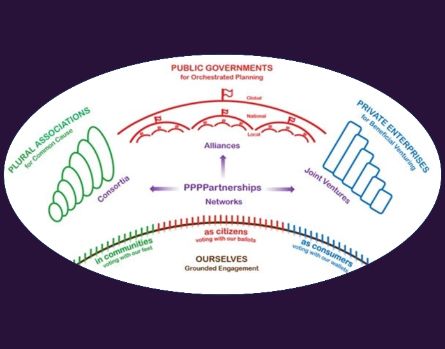
GETTING READY
CAPITALISM IN CRISIS: IS OUR WORLD IN TROUBLE?
As Paul Adler compellingly argues, our world grapples with a multitude of crises intricately tied to the evolution of our capitalist system—perhaps inherently so. This raises the pivotal question: What actions can we take to address these challenges?
PLURALISTS OF ALL COUNTRIES, UNITE(Click on the icon for pdf)
In this article, we delve into Henry Mintzberg's fervent call to "rebalance society". Mintzberg cautions against embracing the ideals propagated by libertarian neo-evangelists who advocate for a "win-win wonderland", promoting the notions that "greed is good, property is sacred, markets are sufficient, and governments are suspect". He asserts that we have been following the wrong gospel: it is not capitalism, but rather THE BALANCE that emerged victorious at the end of the cold war. This balance encompasses societal forces conducive to the common good, including a private sector of responsible businesses, a public sector of respected governments, and a "plural sector" comprising robust communities. Mintzberg challenges us to restore this balance in order to reinvigorate a positive economy.
Learning Objectives
Learning objectives
The Critical references for this module
Overview of comparative ethics
Click on the symbols next to each core concept to travel to the relevant interviews.
Overview of comparative politics
Selected Readings
Interviews in this module
introduction
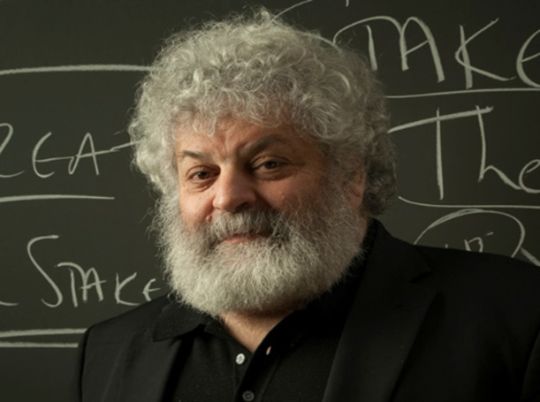
ED FREEMAN
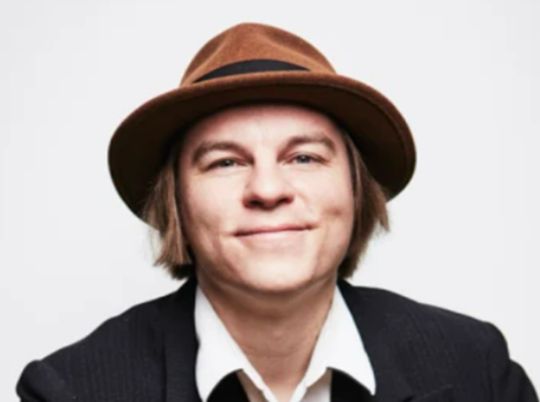
FRANK MARTELA
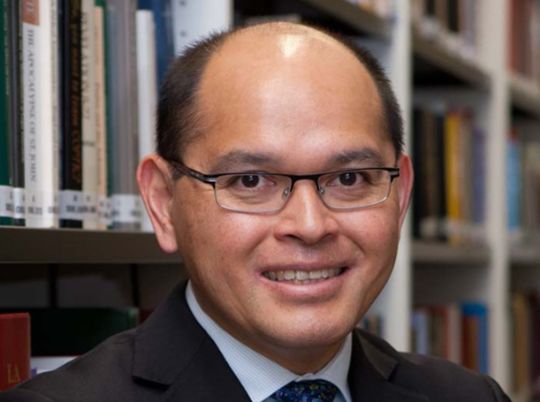
ALEJO SISON
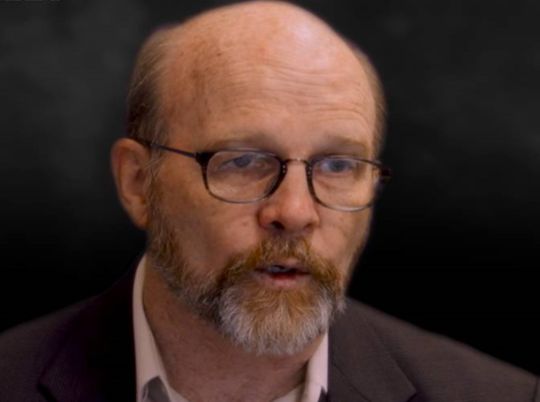
BLAINE FOWERS
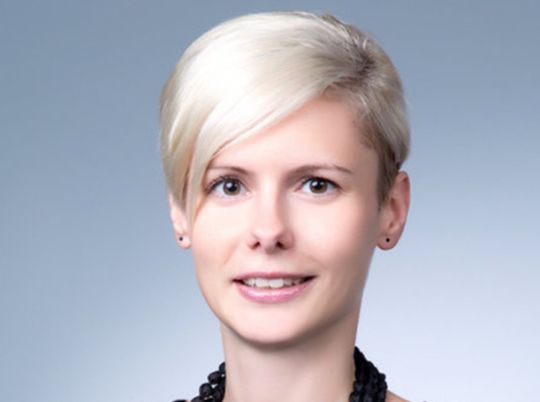
ALICIA HENNIG
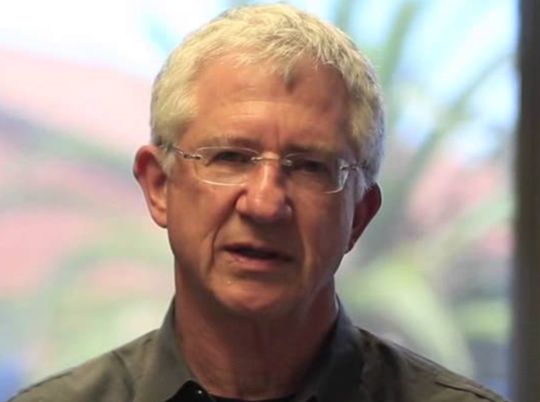
PAUL ADLER
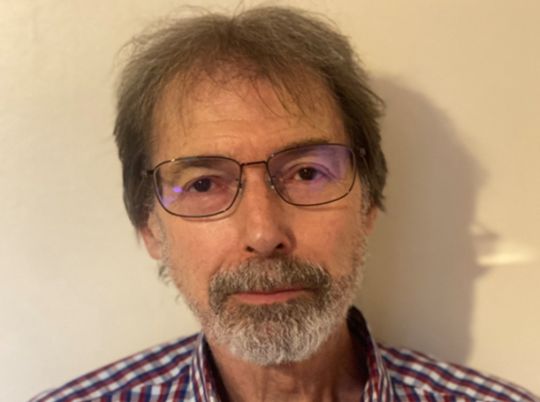
MIKE O'DONNELL
Locating each interview in the learning journey
✿ ABOUT ED FREEMAN
Ed is an American philosopher and Elis and Signe Olsson Professor of Business Administration at UVA Darden School of Business. He is best known for his work on stakeholder theory. Besides his six honorary doctorates, he has received Lifetime Achievement Awards from the World Resources Institute and Aspen Institute, the Humboldt University Conference on Corporate Social Responsibility, the Academy of Management and the Society for Business Ethics. Ed is a prolific writer and his books, such as “Strategic management — a stakeholder approach”, “Managing for Stakeholders” and “Stakeholder Theory” are seminal works, and his articles are frequently cited.
Besides his passions for writing, making music and martial arts, teaching is close to his heart. The ability to enable students to think critically and take different perspectives earned him several awards throughout his career. Moreover, Ed suggests that “we are only as good as the stories we tell” — he has worked with many executives and companies around the world to enable new narratives and help to make business and ultimately the world a little better.
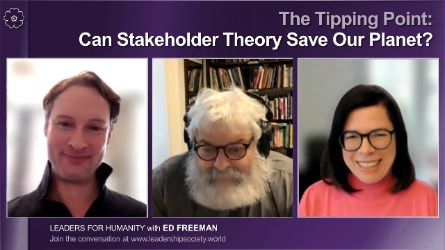
DISCOVERING THE DIALOGUE WITH
ED FREEMAN
We approached Ed, because for nearly 50 years Ed has developed stakeholder theory (in spite of Klaus Schwab claiming it as his invention) as one of the most important narratives to counter a business ethic founded on single-minded shareholder value maximisation. Ed consistently emphasizes that ethics and value judgments are integral components of sound business decisions, rather than philanthropic add-ons (as he suggests CSR sometimes advocates) or undue taxation (as argued by Milton Friedman). Furthermore, Ed contends that stakeholder engagement can generate value for all parties involved. Finally, Ed is a convinced pragmatist, and his writings helped us much to see how pragmatism unfolds in practice, and where its limitations lie.
KEY LEARNING GOALS (click LIGHTBULB to see the INQUIRY MAP)
- What is Stakeholder Theory? How does it help business to contribute to a better society, and what role do managers play in achieving this goal?
- Why do some businesses struggle to act responsibly, and what steps can be taken to remove internal practices that hinder responsible behavior?
- How does Pragmatism undergird business ethics, and where are its limitations?
✿ ABOUT FRANK MARTELA
Frank Martela is a cross-disciplinary researcher with a PhD in both philosophy (University of Helsinki) and organisational research (Aalto University). He is a University lecturer at Aalto University and docent of well-being psychology at the University of Tampere and has spoken to hundreds of audiences worldwide, with lectures at Universities on four continents, including Stanford University and Harvard University. His steadily expanding research was published in numerous academic journals within psychology, philosophy and organisational design. As an expert in the meaning of life, Frank has been interviewed for the New York Times, Le Monde, Die Süddeutsche Zeitung and many others.
In addition to his academic work, Frank is also one of the co-founders and current chairman of the board of Filosofian Akatemia Oy, a company with expertise in measuring engagement, motivation and meaningfulness at work and consulting organisations on how to make work-life better. His most recent book is called “A Wonderful Life”.
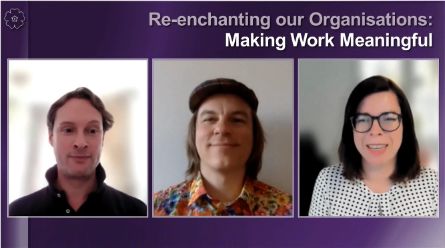
DISCOVER THE DIALOGUE WITH
FRANK MARTELA
We approached Frank for several reasons. Firstly, we wanted to get clearer about a possible distinction between "goodness" and "meaning", as well as between normative ethics and mostly descriptive psychology. Helpfully, Frank has dedicated decades of his researcher life to questions about meaning, meaningfulness, significance and self-realization at work or in life. Secondly, we wanted to explore whether and how virtue ethics could benefit from integration with (positive) psychology, as a normative foundation for our theory. Frank has developed multiple iterations of a practical framework that seemed very interesting. This also links to our interview with Blaine Fowers which seeks to explain "telos" in anthropological and evolutionary terms. Finally, we wanted to again explore (the limitations) of pragmatism in the context of morality. Here, we also connect with our interview with Ed Freeman.
KEY LEARNING GOALS (click LIGHTBULB to see the INQUIRY MAP)
- What is the history of pragmatism? What are its ontological and ethical limitations?
- What is a meaningful life? What is meaningful work?
- How can work become more meaningful?
✿ ABOUT ALEJO SISON
Alejo Sison is a professor for business ethics at the School of Economics of the University of Navarre. He is Visiting Ordinary Professor at the Busch School of Business of the Catholic University of America and Adjunct Professor at the McCourt School of Public Policy, Georgetown University. He was President of the European Business Ethics Network (EBEN) from 2009 to 2012. In 2019 he was elected to the board of the Society for Business Ethics and in 2023 he will be President.
His research is at the juncture of ethics, economics, and politics, with a focus on the virtues and the common good. In our interview, we discuss a virtue ethics perspective on the theory of the firm, corporate governance, the moral capital of leaders, Ethics and AI, and also his latest sole-authored book on “Happiness and Virtue Ethics in Business: The Ultimate Value Proposition” (Cambridge University Press, 2015).
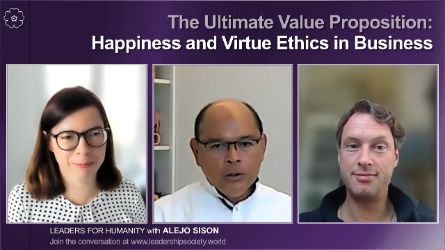
DISCOVERING THE DIALOGUE WITH
ALEJO SISON
We chose to interview Alejo for three specific reasons. Firstly, we wanted to further deepen our understanding of virtue ethics, in the context of "Thomism", MacIntyre's notion of practice and Catholic Social Teaching. What exactly is good, both private and common? What is the relevance of Aristotelian telos versus ergon? Secondly, Alejo had extensively studied management from the perspective of Aristotle's political philosophy and we were intrigued by Alejo's attempt to operationalize virtue ethics in modern corporate governance, a topic that is at the heart of our inquiry. Finally, we wanted to further scrutinise the linkage between virtues, "eudaimonia" and happiness, in order to understand better how individuals could practically cultivate a good character and lead a good life.
KEY LEARNING GOALS (click LIGHTBULB to see the INQUIRY MAP)
- What are the key concepts of Virtue Ethics and how are they defined? What exactly are virtues? What is eudaimonia?
- How can the "common good" be operationalised in management?
- How can we become good by practicing virtues?
✿ ABOUT BLAINE FOWERS
Blaine Fowers (Ph.D., University of Texas at Austin in 1987) is Professor of Counseling Psychology at the University of Miami. He is a Fellow of the American Psychological Association. His primary scholarly interest is in exploring the moral dimension of psychology, both in research and practice. He is currently directing the Goal Orientations and Life Success (GOALS) Project, which is focused on documenting the existence and functioning of higher order goals and investigating the links between pursuing inherently valuable goals and human flourishing. He is the author of The Evolution of Ethics, Virtue and Psychology, Beyond the Myth of Marital Happiness, and a co-author of Frailty, Suffering, and Vice: Flourishing in the Face of Human Limitations and Re-envisioning Psychology.
He is the 2016 winner of the Joseph Gittler Award for Contributions to the Philosophical Foundations of Psychology and was a Distingusished Visting Professor at the University of Birmingham, UK in May, 2016. Blaine has published numerous peer-reviewed articles on virtue and practical wisdom in psychology.
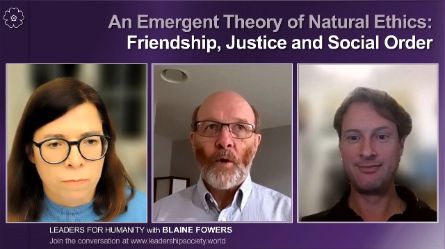
DISCOVER THE DIALOGUE WITH
BLAINE FOWERS
Since the beginning of our project, we had struggled with a certain lack of precision in what Virtue Ethics claims to be a normative "ergon", i.e. the essential function or purpose of human beings. In positive psychology we had already encountered some similar but rather superficial suggestions related to an alleged "optimal functioning" of people, but we were not convinced these could ever become the foundation for any normative - and objective - foundation of morality. Hence, we were intrigued by Blaine's very unique attempt to explore evolutionary anthropology to develop a more thorough and wide-ranging description of what makes us humans "truly human". Furthermore, we were very interested to understand how Blaine more systematically (re-) integrates psychology and philosophy - bridging a divide that goes back to the famous debate about "psychologism" between Gottlob Frege and Edmund Husserl in the late 19th century, and more generally implying a phenomenological ontology - and thus to deepen our understanding of virtues, flourishing and practical wisdom.
KEY LEARNING GOALS (click LIGHTBULB to see the INQUIRY MAP)
- What is psychological philosophy? What is phenomenology?
- What are the insights from evolutionary theory into the development of ethics and human morality?
- How can evolutionary psychology strengthen Virtue Ethics?
✿ ABOUT ALICIA HENNIG
Alicia Hennig is an Associate Professor of Business Ethics at the Technical University of Dresden. With extensive experience in intercultural work and research, her academic expertise spans various research fields, including political theory, Chinese philosophy in business and management, virtue ethics in business, ethics in finance, corporate social responsibility (CSR), and sustainability. She holds a Magna Cum Laude doctorate in Applied Philosophy and Ethics from the Technical University Darmstadt in Germany.
Alicia Hennig's notable contributions to academia extend beyond research; she is an experienced lecturer and guest lecturer, having taught courses on cultural and intercultural issues, comparative philosophy, and business ethics. Her international academic journey has taken her to institutions in China, Spain, the United Kingdom, and more, and she is one of the few contemporary business ethics scholars who is actively “translating” Chinese culture and thinking for a Western context. She is an outspoken critic of postmodern capitalistic systems in both East and West and of Chinese mercantilism in Academia.
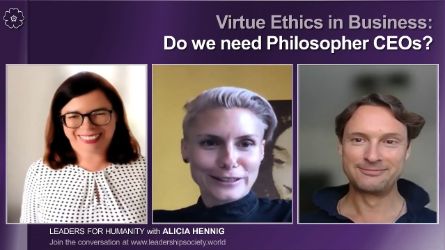
DISCOVER THE DIALOGUE WITH
ALICIA HENNIG
KEY LEARNING GOALS (click LIGHTBULB to see the INQUIRY MAP)
- How are virtues conceptualized and integrated in western and eastern virtue ethics tradition?
- How are virtues developed, and in particular, how do roles, rituals and formal education contribute to this development?
- What are the characteristics of daoistic leadership, and how has this concept influenced contemporary management practice within but also beyond China?
✿ ABOUT PAUL ADLER
Paul Adler is a Professor of Management and Organization, Sociology, and Environmental Studies at the University of Southern California. He holds the Harold Quinton Chair in Business Policy, and currently serves as the President of the USC Academic Senate. He began his education in Australia and moved to France in 1974, where he received his doctorate in Economics and Management while working as a Research Economist for the French government. He came to the USA in 1981, and before arriving at USC in 1991, he was affiliated with the Brookings Institution, Barnard College at Columbia University, Harvard Business School, and Stanford’s School of Engineering.
Paul has published widely in academic journals, and edited several books, including The Firm as a Collaborative Community: Reconstructing Trust in the Knowledge Economy (2006), The Oxford Handbook of Sociology and Organization Studies: Classical Foundations (2009), The Oxford Handbook of Sociology, Social Theory, and Organization Studies: Contemporary Currents (2014), and co-authored Healing Together: The Labor-Management Partnership at Kaiser Permanente (2009). His most recent book is The 99 Percent Economy: How Democratic Socialism Can Overcome the Crises of Capitalism (2019).
Paul has served as chair of the Technology and Innovation Management Division and of the Critical Management Studies Interest Group of the Academy of Management, and served as President of the Academy of Management in 2013–14.
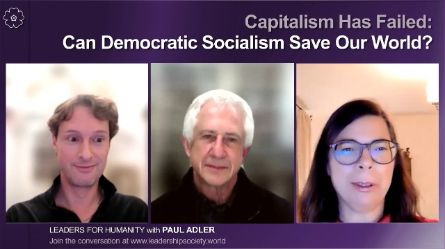
DISCOVERING THE DIALOGUE WITH
Paul ADLER
We were drawn to Paul for several reasons. Firstly, it was highly intriguing that a former president of the American Management Association advocates for Democratic Socialism, challenging mainstream economic theories. Paul's Marxist view on business, business schools, and society provides a much-needed critique of the conventional view of business as a profit-maximizing entity isolated from society. Secondly, Paul bridges the gap between Democratic Socialism, sociological theory (e.g., Max Weber's value rationality), and practical management research (e.g., Kaiser Permanente's participative "strategizing" process). He stands out as one of the few scholars who have developed a credible alternative organizational ideal type, offering both analytical insights and a blueprint for transforming real businesses. Moreover, he leverages insights from organizational research to refine Democratic Socialism, potentially making it a more viable political system. Lastly, Paul's comprehensive exploration of bureaucracy is truly fascinating. He challenges oversimplified and inaccurate stereotypes and, instead of predicting the "death of bureaucracy," argues that it will not disappear anytime soon. This nuanced perspective adds depth to his vision for a transformed society.
KEY LEARNING GOALS (click LIGHTBULB to see the INQUIRY MAP)
- What are the six crises of capitalism, and how can they be mitigated without resorting to democratic socialism, in your opinion?
- How do communism, democratic socialism, property-owning democracy, and social democracy differ? What, in your opinion, are the biggest challenges of democratic socialism, and can they be overcome?
- How is the economy and free markets conceptualised within democratic socialism? What are the challenges, both theoretically and empirically?
- What is the concept of the "ideal type" of an organization, and what are the ideal types that Adler distinguishes? How does Adler argue that value rationality can be scaled, and can you provide examples of companies that resemble a collaborative community?
✿ ABOUT MIKE O'DONNELL
Mike O'Donnell is an esteemed sociologist renowned for his incisive critique of neoliberalism and his visionary perspective on revitalizing democracy. He holds the distinguished title of Emeritus Professor of Sociology at the University of Westminster (UK), where his scholarly pursuits have spanned diverse domains of social theory, social movements, political theory and sociology, identity and difference. Mike's intellectual journey has seen him traverse the academic landscapes of both Britain and the United States, where he has not only conducted extensive research but also shared his knowledge as an accomplished teacher.
His pivotal contributions include authoring "Crises and Popular Dissent" and co-authoring "Alternatives to Neoliberalism: Towards Equality and Democracy." In his work, Mike masterfully dissects the rise of neoliberalism, explores the dynamics of social movements, and envisions a progressive political future. His call to extend democracy into economic and cultural institutions as a means to achieve material and social equality has been particularly influential. Mike's rich body of work continues to inspire those seeking transformative political, economic, and social policies in today's world.
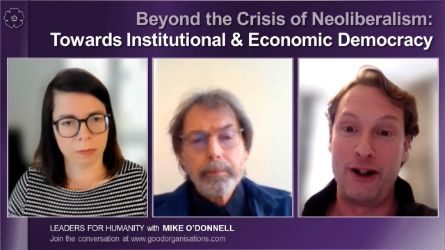
DISCOVERING THE DIALOGUE WITH
Mike O'Donnell
One of the pivotal questions of our inquiry is how to craft "good organisations". This query naturally steers us into the realms of political philosophy and political sociology, which both seek to evaluate the comparative merits of different forms of government.In this context, Mike's work on "institutional democracy", aimed at systematically fortifying and, to some extent, reclaiming social democracy, piqued our interest.
Furthermore, we were drawn to Mike's extensive exploration of neoliberalism as a prevailing discourse that subtly permeates the fabric of Western societies. This resonates with our contemplation of social ontology, rooted in (post-)structuralism and constructionism, which underscores the impact of social narratives and institutions in shaping both individual and collective behavior.
Lastly, Mike's keen observation and analysis of political parties and social movements, particularly his engagement with the Labour Party in the UK after Tony Blair's "New Labour" and Gidden's "Third Way", offer valuable insights into the dynamics of social change. It sheds light on the complex role of political parties in advancing ideological agendas, a subject that intrigued us as we embarked on our exploration of how societal transformation takes place.
Throughout our preparation, we were inspired by Mike's references to Karl Polanyi's Great Transformation.Polanyi highlights the destructive impact of the commodification of labor, land, and money and argues that economies must remain embedded into social and cultural systems. He suggests that a "double movement," where social democracy acts as a corrective force against the harms of unfettered capitalism is essential to counterbalance the negative consequences of the free market. Yet, arguably, this double movement must ultimately fail. This became a point of significant interest in our conversations
KEY LEARNING GOALS (click LIGHTBULB to see the INQUIRY MAP)
- What is Social Democracy and what are its challenges? How is global "democratisation" progressing? Is an "ideal" of democracy justified?
- What are the core concepts in Polanyi's Great Transformation? What does it mean for the evaluation of neoliberalism? Can the 'double movement' work?
- How could (Social) Democracy be strengthened? In this context, what is an 'Institutional Democracy'? How could political parties supporting social democracies position their message against populism and nationalism?
Discover New Puzzle Pieces of Wisdom On A Search For Eureka Moments!
Introduction


Pragmatism and Business Ethics

The linkage between reality (ontology), morality (ethics) and the meaning of life
(Interview with Frank Martela)
Overview of the module
A) Introduction to the module (interactive session)
- Module overview
- Learning objectives
- Schedule
B) Weekly interviews (and collaboration in Google Classroom)
- Monday introduction for each interview
- Wednesday pre-readings and resources
- Friday shared screening (optional)
C) Shared reflection and Q&A (interactive session)
- Review of learning outcomes
- Q&A
- Introduction to deep dives
D) Personal reflection (submission on Google Classroom)
- One-pager of personal reflection on the module to be shared with other participants
E) Further personal explorations (optional)
 .
.